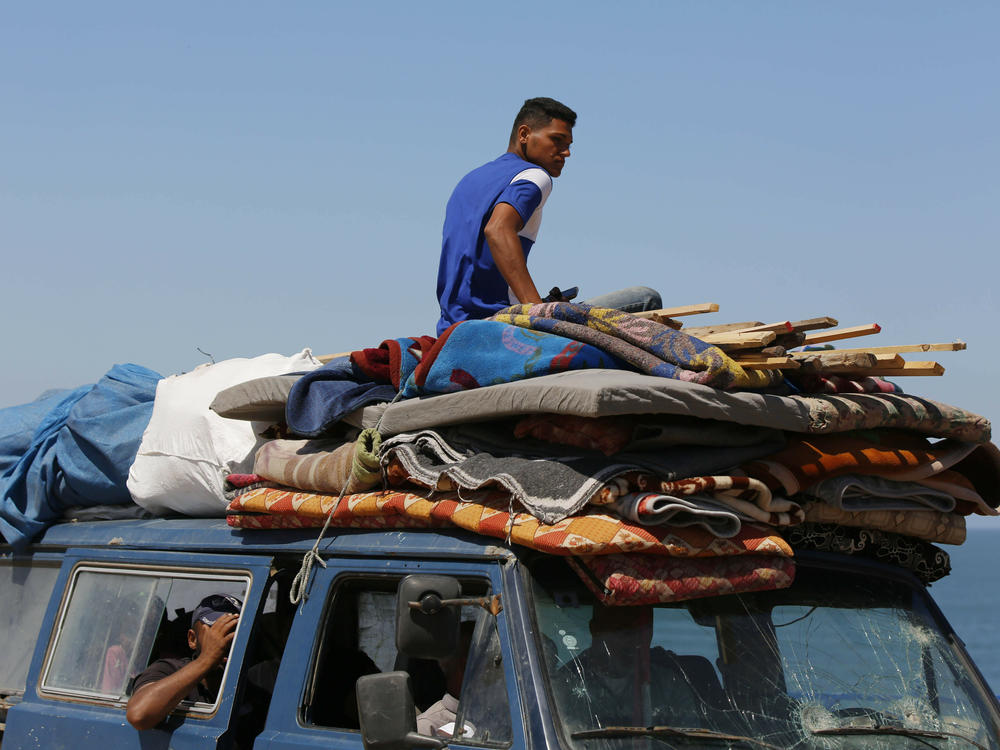Section Branding
Header Content
Israel seized control of the Rafah border crossing. The impact could be devastating
Primary Content
Israel has seized control of the Rafah border crossing. The consequences could be devastating for civilians.
Since the beginning of Israel's war in Gaza, Palestinians have been pushed farther and farther south. At least 1.3 million people have now been squeezed into Rafah, a small area bordering Egypt. More than half of those people fled fighting in other parts of Gaza.
On Monday, Israeli forces dropped leaflets from the sky in Rafah instructing people to seek refuge in an "expanded humanitarian area" north and northwest of the city. The U.N. says now more than 75% of the Gaza Strip is under evacuation orders.
Less than 24 hours later, Israeli tanks rolled into the eastern part of Rafah, seizing control of the border crossing between Egypt and Gaza.
Israeli airstrikes had already been pounding Rafah for weeks, killing hundreds since late March — most of them women and children, according to hospital records.
No aid can pass through the crossing, and one of the area's main medical centers has shut down. Jens Laerke, a spokesperson for the U.N. humanitarian office, warned that if the crossing stays closed for long, "it would be a very effective way of putting the humanitarian operation in its grave."
You're reading the Consider This newsletter, which unpacks one major news story each day. Subscribe here to get it delivered to your inbox, and listen to more from the Consider This podcast.
Palestinians feel there's nowhere left to go.
The Israeli military has designated an area northwest of the evacuation zone in Rafah as an "expanded humanitarian zone."
But to many Palestinians, that promise of safety means nothing.
NPR spoke with several people fleeing from violence in Gaza, including Fatima Balah, an elderly woman who walks with a cane. "We've seen nothing but suffering," she said.
AbdAlwahab Hamad works for a community-development organization in Gaza. He spoke with NPR from Rafah, saying:
"The concept of a safe-designated area has become elusive for the people of Gaza. It's an illusion because it has been shattered. We speak about 1.3 million Palestinians living in a place smaller than Heathrow airport. [Rafah] is the last remaining sanctuary in Gaza, the last refuge. And by the way, there is no refuge."
While the Israeli military says troops are not advancing towards the main city of Rafah in this stage of operations, there's concern the incursion will expand.
According to James Smith, an emergency doctor in Rafah, not everyone can leave the city. People who are very ill or wounded are struggling to find treatment as the city's health system collapses.
Several smaller hospitals in the area have begun evacuating patients "because they're fearful of what the Israeli military might do in or around those health facilities," Smith said.
Israel's offensive is testing U.S. support
U.S. officials have repeatedly urged Israel to not invade Rafah. In a March interview with MSNBC, President Biden has even warned doing so would cross a "red line."
Yet officials have not clarified the contours of that line. The administration maintains Israel's operation in Rafah so far has not crossed that line – but the latest developments in the war could lead to a tipping point in U.S. support.
The Biden administration paused a shipment of more than 3,000 bombs to Israel last week because of concerns they could be used on Rafah. A senior administration official confirmed the pause, speaking to NPR on condition of anonymity. The administration is also reviewing whether to hold back future arms shipments, the official said.
Israeli government spokesperson Avi Hyman said the operation "is the beginning of our mission to take out the last four Hamas brigades in Rafah. You should be in no doubt about that whatsoever."
To hear firsthand about the civilian impact of Israel's operation in Rafah, listen to the full episode by tapping the play button at the top of the page.

